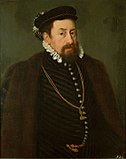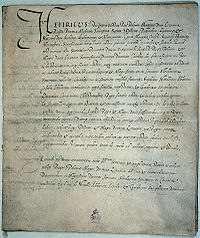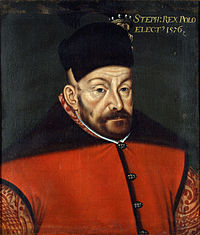Free choice (1576)
 |
||||
|
||||
|
|
||||
| Elected King of Poland and Grand Duke of Lithuania | ||||
|---|---|---|---|---|
| candidate | Stephan Báthory | Anna Jagiellonica | Maximilian II | |
| Political party | piastic faction | piastic faction | Habsburg faction | |
|
|
||||
The free election of 1576 was the second of its kind to determine the king and grand duke of the Royal Republic of the Polish Crown and the Grand Duchy of Lithuania by the nobility as a whole. It took place between November 8, 1575 and February 1, 1576. On the night of June 28th to 29th, 1574, King Heinrich III. Poland in order to be able to claim the French crown. Poland-Lithuania was thus without a ruler and had to be governed by an interregnum . The interim government ended with a double election; Stephan Báthory became the new king after months of negotiations.
background
When Heinrich III. of the death of his brother Charles IX. learned, he went to France on the advice of his mother Caterina de 'Medici to become the new king there. Even after leaving the confederation, he continued to claim the title of King of Poland and represented the interests of the Kingdom of Poland in France . His departure had been considered beforehand. After marrying Heinrich, Anna Jagiellonica was to rule in Poland and enable rule in two countries.
The state federation was threatened with anarchy due to the open question of rule . To counteract this, the Primate Poloniae convened a meeting of Szlachta and senators towards the end of August 1574 , with representatives from the Grand Duchy of Lithuania , Duchy of Livonia and Prussia being left out of the royal stake . The Catholic party spoke out in favor of Heinrich III. continue to be regarded as the Polish king. However, the majority favored an interregnum . As part of a compromise solution, Heinrich was called to return by May 12, 1575.
On the same day there was a meeting in Stężyca . No decisions could be reached at the meeting, only the fronts between the Habsburgs and “anti-Habsburgs” hardened. The stalemate ended with the invasion of the Tatars in Red Ruthenia and Podolia in which many people were taken prisoner. The Primate was able to proclaim an interim government through a majority in the Senate.
Convocation sejm
The primate set the Konvokationssejm (pl. Sejm konwokacyjny) on October 3, 1575, which decided on November 7, 1575 as the election date. The French and Habsburg camp, which was represented by the Primate Jakub Uchański and the majority in the Senate , spoke out in favor of Maximilian II . Through his promise to enforce judgments by ecclesiastical courts , he received the support of the episcopate . In addition, he was greeted by Protestants, a large part of the magnates and Prussian cities.
The Szlachta turned against his candidacy, but was unable to put up a candidate of their own. Jan Zamoyski could imagine a “Piast” . Johann III. and Stephan Báthory were possible opponents. The Turkish ambassadors played a major role. They gave their recommendation for a "Piast", Johann III. , or Stephan Báthory. The election of Maximilian could endanger the previous Turkish peace policy towards the confederation.
choice

The Wahlsejm (pl. Sejm elekcyjny) began on November 8, 1575 with the hearing of representatives of the royal candidates. Maximilian II continued to be the favorite in the Senate, while the members of the Sejm included supporters of a “Piast” ( Jan Zamoyski , Mikołaj Sienicki ) and Stephan Báthory ( Andrzej Zborowski ).
The dispute came to an end on December 12, 1575 when Primate Jakub Uchański, under pressure from the nuncio Vincenzo Lauro, announced the election of Maximilian II as King of Poland and Grand Duke of Lithuania. Szlachta , who had gathered on the polling ground in Wola , was not included and felt offended; the primate was shot. In view of this, the Szlachta managed to agree on a candidate. The outlook for Stefan Batory improved after being in Transylvania his rival Kasper Bekiesz defeated. The minor nobility decided according to the recommendation of Zamoyski and Tęczyński for the election of Anna Jagiellonica as queen, who should be married to Báthory. The victory of the respective candidate was made dependent on the coronation in the Wawel Cathedral .
coronation

Báthory's supporters met in Jędrzejów on January 18, 1576, and appeared in Kraków a month later . Most of the sympathizers come from Red Ruthenia, among them the former senators Andrzej Zborowski and Stanislaus von Gorka and the bishop from Kujawy Stanisław Karnkowski . In comparison, the emperor's supporters appeared more listless. Envoys from the emperor came to Jędrzejów to promote Ernst of Austria instead of Maximilian II's coronation . With the Arian Hieronim Filipowski a representative of Báthory also appeared.
A meeting on February 1, 1576 confirmed the election of Stephan Báthory and dated his coronation on March 4, 1576. On February 8, 1576 he took an oath on the Pacta conventa in the Cathedral of Mediaş . He promised to regain the territory occupied by Ivan IV . Then Báthory prepared his trip to Poland. Maximilian II was self-confident and was not worried about his opponent. He refused to send a representative to the meeting of his followers in Łowicz and argued with Polish delegates about the form of the Pacta conventa, which he had signed on March 23, 1576 in the Augustinian Church in Vienna . On March 4, 1576, the Krönungssejm (pl. Sejm koronacyjny) took place in Cracow, where the ambassadors of Báthory presented the sworn Pacta conventa. On April 6, 1576, the prince of Transylvania crossed the border and appeared on April 18 in a solemn arrival in Krakow.
The marriage with Anna Jagiellonica took place on May 1, 1576 by Stanisław Karnkowski , who also carried out the coronation. His election was rejected by Lithuania , Polish Prussia and Jakub Uchański . After the new king entered into a dialogue with his opponents, the opponents also recognized his rule.
annotation
- ↑ Colloquial expression for candidates from inland who do not come from the Piast dynasty .
swell
- Stanisław Grzybowski: Dzieje Polski i Litwy (1506-1648) , in: Wielka Historia Polski, Kraków 2003
- Urszula Augustyniak: Historia Polski 1572-1795 , Warszawa 2008
- Stanisław Cynarski: Zygmunt August , Wrocław 2004
- Zbigniew Wójcik: Historia powszechna: wiek XVI-XVII , Warszawa 1991
- Mariusz Markiewicz: Historia Polski 1494-1795 , Kraków 2002





